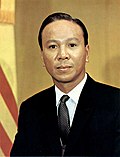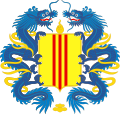This article needs additional citations for verification .(November 2025) |

This is a list of leaders of South Vietnam, since the establishment of the Autonomous Republic of Cochinchina in 1946, the establishment of the State of Vietnam in 1949, and the division of Vietnam in 1954 until the fall of the Republic of Vietnam in 1975, and the reunification of Vietnam in 1976.
Contents
- Legends
- Heads of state
- State of Vietnam (1949–1955)
- First Republic of Vietnam (1955–1963)
- Military junta (1963–1967)
- Second Republic of Vietnam (1967–1975)
- Provisional Revolutionary Government of the Republic of South Vietnam (1969–1976)
- Heads of government
- Symbols
- Standards
- Document seals
- Podium seals
- See also
- References
- External links











































